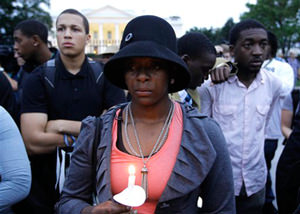Murder Is Good Politics, Bad Justice
In my own experience as a journalist covering this issue, the vast majority of politicians who defend capital punishment do so out of rank opportunism.
I don’t know if Troy Davis was innocent, but I do know that the evidence for demanding a re-examination of his conviction, including the recanted testimony of most of the witnesses against him, was overwhelming. But of course that is now beside the point, which is exactly what is so wrong about the use of the death penalty. No matter what evidence of innocence might be produced in the future, it is of consequence no longer.
That is a compelling argument against the death penalty—no room for correction—but there are others. The most egregious argument for capital punishment is the claim that the finality of officially condoned killing is a necessary guarantor of civilized order. Egregious because it is not possible to make that case without explaining why most of the democratic societies that we admire shun the death penalty as contrary to their most deeply held values.
Or is it China, Iran, North Korea and Yemen, which, along with the United States, led the world in government executions, that we most admire? There is something stunningly disgraceful about the company we keep on this issue.
As Amnesty International — the world’s premier human rights organization, which deserves high marks for its anti-death penalty campaign — points out, more than two-thirds of the world’s nations have abolished the death penalty in law or practice. I defy anyone to compare the list of countries that have retained the death penalty with those that have abolished it and then conclude that it serves a needed purpose.
It is obvious from the experience of those nations without the death penalty and our own 17 states that have banned capital punishment that this barbaric custom is not a necessary, let alone efficient, means for ensuring public safety. Due process in the United States, which claims to have an enlightened legal system, requires death penalty procedures that are costlier than appropriate incarceration.
Governments that cling to this primitive ritual of state-sanctioned murder do so not to induce respect for law but rather to indulge a lust for vengeance. Toward that end it would be far more honest to have the bound prisoner stoned to death by the governors, state legislators, prosecutors and judges who support the death penalty rather than employing lethal injections by disengaged technicians. Forcing them to be the executioners in actual practice rather than as a matter of legal theory would compel a far greater sense of personal responsibility than politicians and some others tend to exhibit on the matter.
From my own experience as a journalist covering this issue, the vast majority of politicians who defend capital punishment do so out of rank opportunism, which they demonstrate, particularly when the conversation is off the record, by citing polling numbers rather than evidence of the death penalty as a capital crime deterrent.
As I waited for the news of Troy Davis’ fate, my thoughts kept returning to that day in 1960 when we Berkeley students picketed the California governor’s office in pleading for a stay in the execution of convicted rapist Caryl Chessman, who was never accused of murder. It didn’t come because Gov. Pat Brown, despite his deep reservations about the case, had succumbed to public opinion. I never imagined then that more than half a century later the death penalty would still be enforced. That it is mocks our claim to be a moral leader in this world.
It is appropriate that we grieve for the slain police officer, Mark MacPhail, but if Davis was not the one with the gun, as he claimed to the end, the true murderer will have gone unpunished, as suggested by Davis’ haunting plea to the MacPhail family minutes before he died: “I did not personally kill your son, father, brother. All I can ask is that you look deeper into this case so you really can finally see the truth.”
Execution is a means of summarily ending the pursuit of justice rather than advancing it.
This case was so freighted with contradictions that a stay of execution was clearly in order. As Amnesty International spokesperson Laura Moye stated: “Today Georgia didn’t just kill Troy Davis, they killed the faith and confidence that many Georgians, Americans, and Troy Davis supporters worldwide used to have in our criminal justice system.”

|
Click here to check out Robert Scheer’s new book, |
Independent journalism is under threat and overshadowed by heavily funded mainstream media.
You can help level the playing field. Become a member.
Your tax-deductible contribution keeps us digging beneath the headlines to give you thought-provoking, investigative reporting and analysis that unearths what's really happening- without compromise.
Give today to support our courageous, independent journalists.






You need to be a supporter to comment.
There are currently no responses to this article.
Be the first to respond.